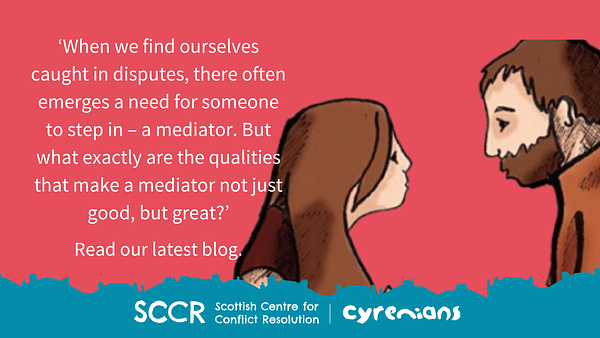What qualities make for a good mediator?
Over the new few weeks as we get closer to the start of the course, we're going to publish some blogs that answer questions about mediation. We begin with 'What qualities make for a good mediator?'

On Monday, 8 January, Cyrenians Scottish Centre for Conflict Resolution kicks off a new course, Mediator and Mediation Skills Training. Accredited by Scottish Mediation, successfully completing the course means participants meet the standard for the first requirement of the Practice Standards for Mediators issued by Scottish Mediation. This newly developed course reflects the current landscape of mediation and conflict resolution; it not only equips you with the latest in mediation theory and practice but also offers a supportive environment for honing your skills. If you'd like to enroll or to know more, you can read this blog or email sccr@cyrenians.scot.
Over the new few weeks as we get closer to the start of the course, we're going to publish some blogs that answer questions about mediation. We begin with 'What qualities make for a good mediator?'
When we find ourselves caught in disputes, clashes, or even just plain old disagreements, there often emerges a need for someone to step in – a mediator. But what exactly are the qualities that make a mediator not just good, but great?
First and foremost, a good mediator is an exceptional listener. Picture this: two individuals or groups at odds, each passionately presenting their side of the story. Amidst the emotional whirlwind, a mediator listens intently, not just to the words spoken but also to the underlying emotions and intentions. It’s not merely about hearing; it's about comprehending and empathizing with both parties.
And it is empathy that is a cornerstone of the traits mediators should possess. Being able to understand where both sides are coming from, acknowledging their feelings, fears, and desires, creates a platform for constructive dialogue. When you can genuinely put yourself in another person's shoes, it fosters an atmosphere of trust and openness.
A knack for remaining neutral is another indispensable quality. A mediator can’t take sides or show favoritism. Remaining neutral means all parties feel heard and valued, preventing any further escalation of tensions.
However, neutrality doesn't equate to passivity. A great mediator is assertive when necessary – guiding the conversation, setting ground rules, and ensuring everyone stays on track. It’s a delicate balance between gently steering the conversation and allowing the parties involved to feel empowered in finding their own resolution.
Another quality that serves mediators well – patience. Rome wasn’t built in a day, and neither are peaceful resolutions to conflicts. It takes time for emotions to simmer down, for perspectives to be understood, and for compromises to be reached. A mediator’s patience is a guiding light throughout this process.
Flexibility and adaptability are key attributes. Not all conflicts are the same, and what works in one situation might not in another. A great mediator tailors their approach to suit the unique dynamics of each conflict, being flexible enough to pivot when necessary.
Last but not least, a good sense of humor can work wonders. It might seem unconventional, but a well-timed joke or a light-hearted comment can ease tension and create a more relaxed atmosphere, allowing parties to approach the resolution process with a clearer mind.
In the grand scheme of things, a good mediator isn’t just someone who resolves conflicts; they are peacemakers, facilitators of understanding, and architects of harmony. Their qualities – listening skills, empathy, neutrality, assertiveness, patience, flexibility, and even a dash of humour – blend together to craft a space where conflicts are transformed into opportunities for growth and resolution.





